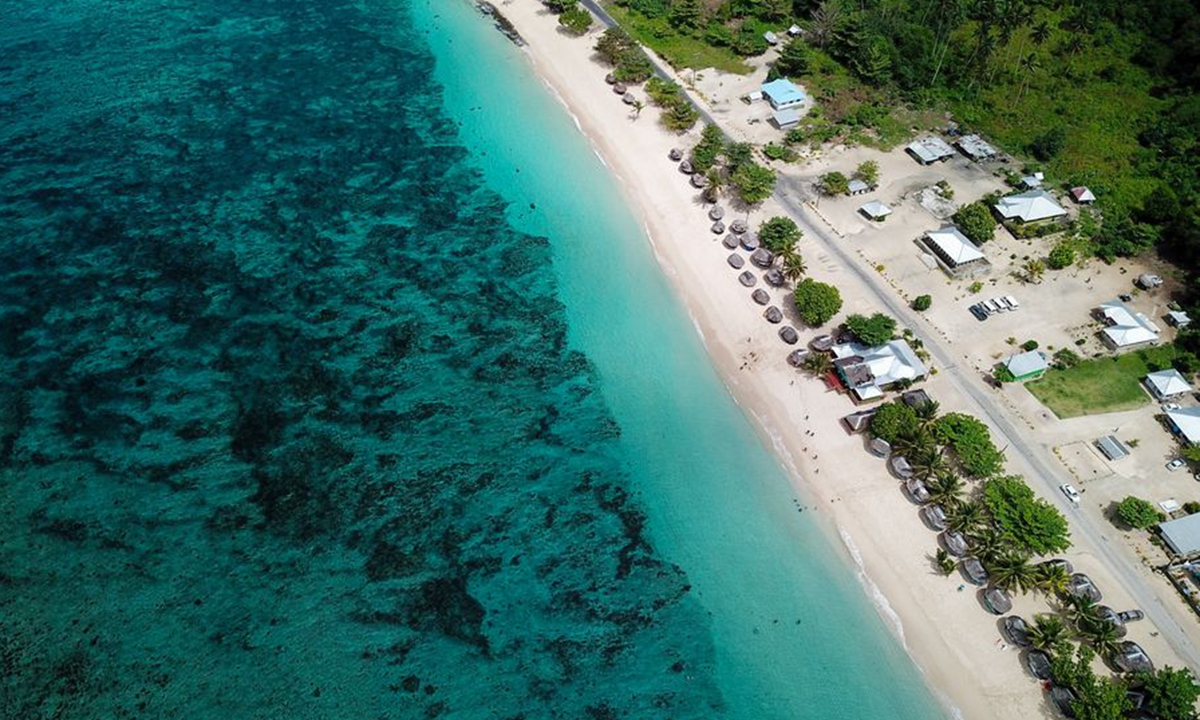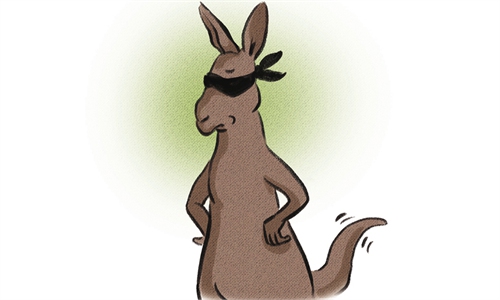
Crystal-clear seawater along the Lalomanu beach at southern part of Upolu Island, Apia, Samoa, Oct 19, 2019. Photo: Xinhua
Australia has stood on the opposite side of the South Pacific countries by tearing up agreements signed between Victoria state and China on the Belt and Road Initiative (BRI). China has signed BRI deals with all the 10 Pacific island countries that have diplomatic ties with China. Australia can neither force these countries to cancel the deals, nor can it move its neighbors away. Confrontation with China will not help Australia gain more influence in the South Pacific region.
Australia and Pacific island countries have had deep and extensive ties in history, politics, economy and security. As China deepens its relations with Pacific island countries, Australia does not regard China as a positive force promoting development of the South Pacific. Instead, it regards China as a threat and an unwelcomed competitor. Australia is afraid of losing influence in the South Pacific, and such a zero-sum mindset is drifting these regional countries apart from Australia.
Since 2018, Australian officials have repeatedly disregarded reality. They have criticized China's infrastructure projects in Pacific island countries and promoted the so-called "debt diplomacy" conspiracy and "China threat" theory. However, BRI projects are based on thorough communication with local governments. Smearing these projects is not only smearing China, but also negatively impacts the governments of the Pacific island countries and the local people. Australia's attack on the BRI has aroused dissatisfaction among leaders of Pacific island countries. For example, Samoan Prime Minister Tuilaepa Sailele said in 2018 that Australia's criticism of China's aid program is to "question the integrity, wisdom and intelligence of the leaders of the Pacific islands" and may "destroy" Australia's relationship with the region.
After the COVID-19 outbreak, Australia has politicized the pandemic and promoted the so-called COVID-19 source investigation in the international community. After the WHO released report on global tracing of COVID-19 origins, Australia joined the US and other countries to question the report. In sharp contrast with Australia, Pacific island countries shared anti-epidemic information and experience with China through video conferences in March and May 2020, which greatly improved their own ability in the COVID-19 fight. The pandemic has not blocked exchanges and cooperation between China and Pacific island countries, but has instead promoted their political mutual trust and bilateral ties. Pacific island countries are still some of the countries with the best control of the epidemic, but Australia has experienced new waves.
With the paranoid foreign policy against China, Australia will inevitably ignore the real needs of Pacific island countries. During the Pacific Islands Forum in August 2019, Australia emphasized on China-related issues but could not give clear responses on climate change issues which Pacific island countries are most concerned about. Many Pacific island countries such as Tuvalu, Palau and Vanuatu accused Australia of not responding well to climate change. The forum, an important platform for Australia to exert regional influence, is facing a crisis since the election of the secretary general did not comply with rotation rules. In February, five countries including Palau, the Marshall Islands, the Federated States of Micronesia, Kiribati, and Nauru pulled out of the Pacific Islands Forum.
Facing the severe challenges of order in the South Pacific region, Australia did not shoulder the responsibilities of a regional power at a critical moment. Instead, the focus of its foreign policy was to confront China.
Most Pacific island countries are still developing and underdeveloped countries. Due to historical and geographic reasons, these countries have faced many constraints in their development, and their economic and social development levels are still low. They will need cooperation and help from the international community for a long time in the future. Although Australia is the biggest donor in the South Pacific, it cannot meet the Pacific island countries' development needs all by itself.
China's huge advantages in infrastructure construction, clean energy development and digital economy are vital to the Pacific island countries' economic and social development. Facing the impact of the COVID-19, China's cooperation with Pacific island countries in public health is also strengthening. China has assisted the region with many urgently needed materials in the COVID-19 fight, and has offered to donate COVID-19 vaccines to countries such as Fiji and Solomon Islands. If Australia wants to win trust and respect from Pacific island countries, it should first focus on people's urgent needs and the practical difficulties faced by these countries.
Australia should become realistic and view China's relations with Pacific island countries from the perspective of a win-win cooperation rather than confrontation. If Australia pressures Pacific island countries to choose sides, it will not only intensify the rift in the South Pacific region, but will also further weaken its own reputation and influence in the region.
The author is executive research fellow at Center for Australia, New Zealand and South Pacific Studies, Chinese Academy of Social Sciences. opinion@globaltimes.com.cn

